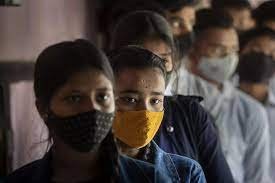Since its announcement as a “public health emergency of international concern” by the World Health Organization (WHO) on January 30, 2020, COVID-19 has significantly impacted the global population. However, after approximately 1,192 days, on May 5, 2023, the WHO declared that COVID-19 was no longer a public health emergency of international concern, indicating that the virus had acquired the status of other endemic diseases. India, in particular, reached the COVID-19 endemic stage approximately a year ago. Despite this transition, there have been instances of knee-jerk and unscientific responses to spikes in COVID-19 cases in India, as evidenced by the recent events in March-April 2023.
With the transition of COVID-19 to an endemic stage, the focus has shifted from containing the virus to managing its impact within the existing healthcare framework. Endemic diseases are those that are constantly present in a specific region or population but at relatively low levels compared to epidemic or pandemic levels. As such, it becomes crucial to strike a balance between mitigating the impact of the virus and ensuring societal functioning.
Despite the recognition of COVID-19 as an endemic disease, knee-jerk reactions to sudden spikes in cases have been observed in India. In March-April 2023, there was an uptick in viral flu and SARS-CoV-2 cases, which led to the closure of schools in certain Indian cities and states. Although some school closures were implemented without a formal government directive, their managements made mask-wearing mandatory for children to attend classes, suggesting an implicit endorsement of these measures.
The knee-jerk responses to COVID-19 spikes, such as school closures and mandatory mask-wearing, raise questions about the scientific basis of these decisions. It is essential for public health interventions to be evidence-based and rooted in scientific research to ensure effectiveness and avoid unnecessary disruptions. While certain measures, like mask-wearing, have proven to be effective in preventing the spread of COVID-19, their implementation should be guided by expert advice and government directives rather than implicit endorsements.
As India transitions to living with COVID-19 as an endemic disease, finding the right balance between precautionary measures and societal functioning becomes crucial. School closures have significant implications for children’s education and well-being, and therefore, decisions regarding their closure should be based on a careful assessment of risks and benefits. Similarly, mandating mask-wearing should be accompanied by clear guidelines and effective communication to ensure compliance and minimize confusion.
To address the challenges of managing COVID-19 as an endemic disease, the government plays a pivotal role in providing clear directives and guidelines. It is essential for the government to work in coordination with public health experts, leveraging scientific evidence and expert opinions to make informed decisions. Clear communication channels need to be established to disseminate accurate information to the public, dispel misinformation, and promote understanding of the rationale behind specific measures.
As COVID-19 transitions to an endemic stage, it is imperative to respond to spikes in cases with evidence-based measures rather than knee-jerk reactions. In India, recent instances of school closures and mandatory mask-wearing without formal government directives highlight the need for a more coordinated and scientific approach. Striking a balance between precautionary measures and societal functioning is crucial, and the government’s role in providing clear guidelines and effective communication is vital. By adopting a well-informed and pragmatic strategy, India can effectively manage the impact of covid 19.


